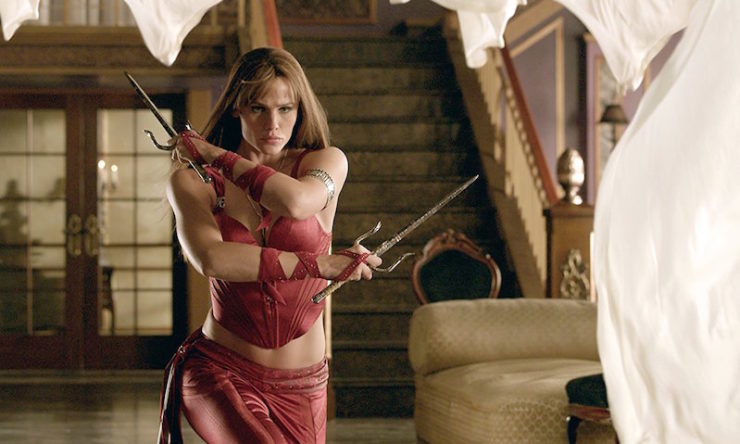The hilarious thing about Elektra is that she was originally only supposed to appear in one issue and never be seen again.
Elektra first appeared in Frank Miller’s first issue of Daredevil as its full-on writer, issue #168, having been the artist and co-plotter previously, working with Roger McKenzie. She was only meant to be a one-off, a woman from Matt Murdock’s past, done in what was in essence a filler issue enabling Miller to get his sea legs as writer, so to speak.
But the character proved to be hugely popular, and he brought her back six issues later, and Elektra has since then refused to die—or stay dead.
While Miller did bring her back, she was by no means a good guy. Established as a ruthless, sai-wielding bounty hunter in her first appearance, she went on to become the Kingpin of Crime’s chief assassin. Her love for Matt Murdock was pretty much her only redeeming feature, as she was an unrepentant bad guy otherwise. That love extended to sparing Matt’s best friend Foggy Nelson when Kingpin put a hit on him. Shortly after that, Bullseye—who wanted her job—tracked her down and killed her.
Elektra also had been involved with a league of ninja assassins known as the Hand. They stole her body in an attempt to resurrect her. Matt tried to do the channeling-life-force trick he’d seen the ninjas do, but he didn’t have the right training. However, he did do enough so that she was “clean,” and so one of the Hand’s enemies was able to finish the job and resurrect her. She buggered off, now wearing all white instead of red, and the intention was that she would stay away from Daredevil and live her own life. Miller did pair up with Bill Sienkiewicz to do a most surreal miniseries Elektra: Assassin, which only fits in continuity with a really big hammer. (That miniseries did give us the character of S.H.I.E.L.D. Agent Garrett, later seen on screen played by the late Bill Paxton in Marvel’s Agents of S.H.I.E.L.D.) He also did the Elektra Lives Again graphic novel.
Eventually, the character did come back to the comics, appearing in Wolverine’s solo series before coming back to Daredevil for the “Fall from Grace” storyline written by D.G. Chichester. She’s continued to appear in various comics over the years, both in her own series (she’s had three monthly series since the mid-1990s, as well as various miniseries) and appearing in Daredevil, New Avengers, Wolverine, Black Widow, and more, as well as being part of the Shadowland event.
After the 2003 Daredevil film was done, a spinoff starring Jennifer Garner as Elektra was green-lit, based at least in part on Garner’s popularity from the TV show Alias. Rob Bowman—best known as a TV director (Star Trek: The Next Generation, The X-Files, Castle)—directed the film off a script co-written by Zak Penn, who has been involved with a ridiculous number of superhero films and TV shows (his story credit shows up on X2: X-Men United, X-Men: The Last Stand, The Incredible Hulk, and The Avengers, and he co-created the superhero TV show Alphas). Ben Affleck made a cameo as Daredevil, though that was only in the extended home video cut. (Affleck would do the same thing as Batman in Suicide Squad a decade later.)
“Don’t worry, death’s not that bad”
Elektra
Written by Zek Penn and Stuart Zicherman & Raven Metzner
Directed by Rob Bowman
Produced by Gary Foster and Amon Milchan and Avi Arad
Original release date: January 14, 2005
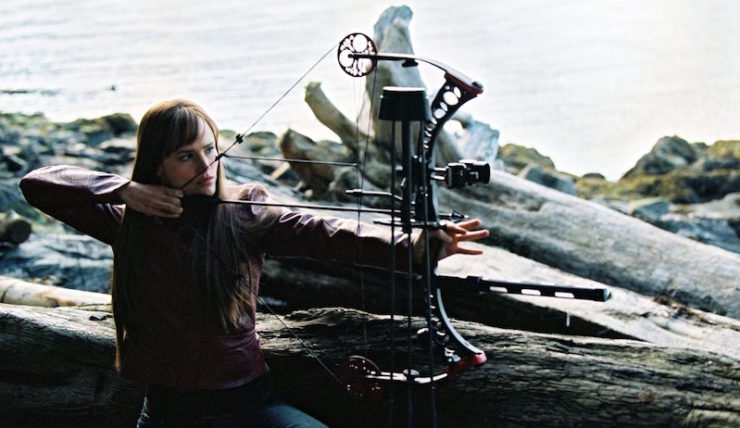
A voiceover tells us about the battle between good and evil, with the good guys wearing white and practicing Kimagure, a discipline that allows adepts to predict the immediate future and also to raise the dead, two very plot-specific skills.
A man named DeMarco is being pursued by an assassin named Elektra. His security chief thinks she’s a myth, but DeMarco is sure she isn’t, and he sits and waits for her to kill him, but only after he provides that security chief, and the audience, with exposition about her rep as a hired killer. Then she shows up and kills his entire security force and him.
Her agent/handler, McCabe, shows up as she cleans the scene of her DNA. They banter for a bit, and he gives her a new job: it requires her to house-sit a place on a remote island. The target will be given to her after she’s there for a few days. The pay rate is higher than her usual, so she goes for it.
Through flashbacks, we find out that she was resurrected by Stick and his gang, and trained with them until Stick kicked her out because she couldn’t get her anger under control. We also find out that her father used to force her to hold her breath underwater for long periods of time when she was a girl, and that Elektra found her mother’s bloody dead body and she remembers her killer as a demon.
While she hangs around the house waiting to find out who her target is, a girl breaks into the house. She’s the daughter of the occupant of the other house on the island. She steals Elektra’s necklace (which apparently belonged to her mother), but Elektra takes it back with the greatest of ease. The girl—whose name is Abby—is impressed with Elektra’s mad ninja skillz. Later, Elektra encounters her father, Mark Miller, who apologizes for his daughter’s acting out
Abby convinces Elektra to come to the Millers’ place for Christmas dinner, and it’s pleasant, though it’s obvious that the Millers’ story about coming there from Baltimore is as big a lie as Elektra’s telling them that she’s in corporate payroll reduction.
Elektra finally gets the commission—and it’s both Mark and Abby Miller. She sets up to kill them with a bow and arrow, but can’t do it. She tells McCabe that she’s refusing the contract, and starts to leave the island—but then goes back to save them from the next assassins, which turn out to be from the Hand. Elektra dispatches them, and they disintegrate when they die.
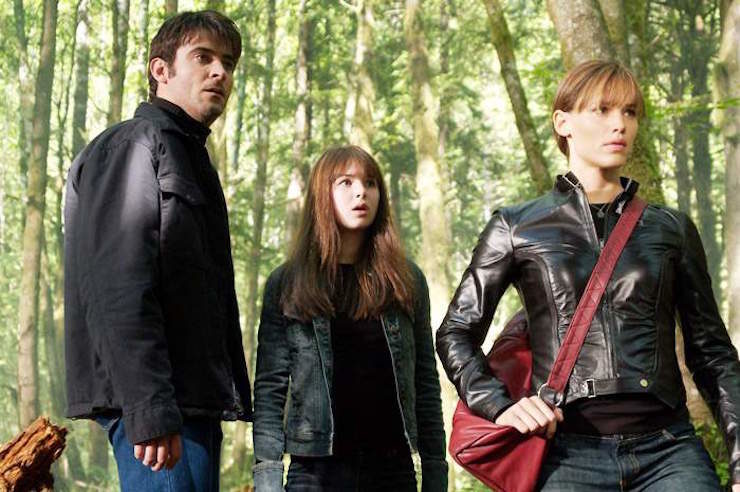
It turns out that Abby is their target: she is “the treasure,” a girl mentioned in the opening voiceover who has the power to serve either the light or the dark. After the Hand’s assassins fail, the head of the Hand, Roshi, sends his son, Kirigi, and his team of super-powered badasses—Tattoo, Kinkou, Typhoid, and Stone—to kill Elektra and capture Abby.
Elektra takes the Millers to Stick, who’s hustling pool. Stick refuses, convincing Elektra that she should protect them, especially since it turns out he was the one who hired her to “kill” them in the first place—insisting on her being there a couple days beforehand was meant to allow her to get to know her target before being asked to kill them. Elektra takes them to McCabe’s place, to McCabe’s annoyance. Tattoo is covered in animal tattoos, and he can animate them and send them to do his bidding. He uses a bird to track our heroes down, and Kirigi and his gang show up. McCabe sacrifices himself to enable the other three to get away to a forest. Elektra kills Stone and Kinkou, and Abby reveals herself to be a martial arts prodigy. Typhoid infects Elektra, but Stick and his gang show up and drive Kirigi, Typhoid, and Tattoo off. Stick is able to resurrect Elektra once again and they regroup at Stick’s training ground. Abby works with Stick’s people, while Elektra contacts Kirigi, er, somehow, and challenges him to a one-on-one duel at the former Natchios mansion—which, we find out, is where Kirigi killed Elektra’s mother for reasons the script never bothers to explain.
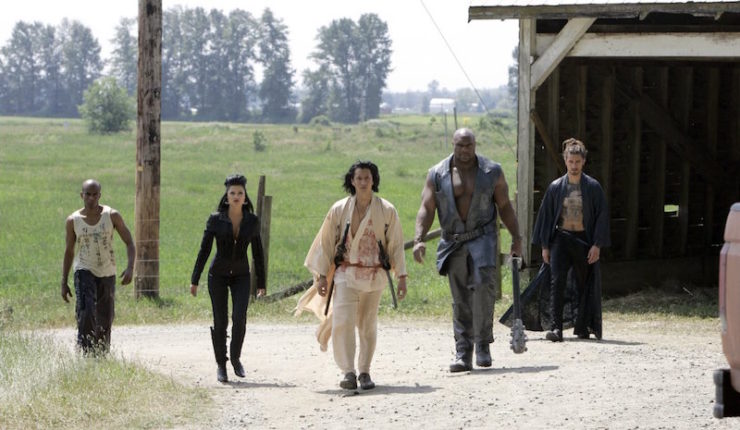
Kirigi, being the bad guy, didn’t come alone, and he sends in a bunch of Hand assassins to take care of Elektra, but she uses Kimagure to predict their entry point and ambush them. She and Kirigi then fight a lot, and Kirigi’s about to win when Abby shows up, as she followed Elektra, er, somehow (actually, it’s unclear how Elektra got there, but considering it’s a remote mansion, operating a motor vehicle was probably involved, and it’s unclear how thirteen-year-old Abby managed to keep up, but whatever). The two of them fight Kirigi and banter, and then Typhoid and Tattoo show up and distract Abby. Elektra manages to kill Tattoo before his animated snakes can overwhelm Abby. She then fights Kirigi and kills him, but Typhoid, claiming to also be a Treasure, kills Abby. Elektra kills Typhoid, and then is able to use Kimagure to resurrect Abby.
Elektra goes off to be an assassin some more after three successive hearts-and-flowers chats with Abby, Mark, and Stick.
“The second life isn’t like the first, is it?”
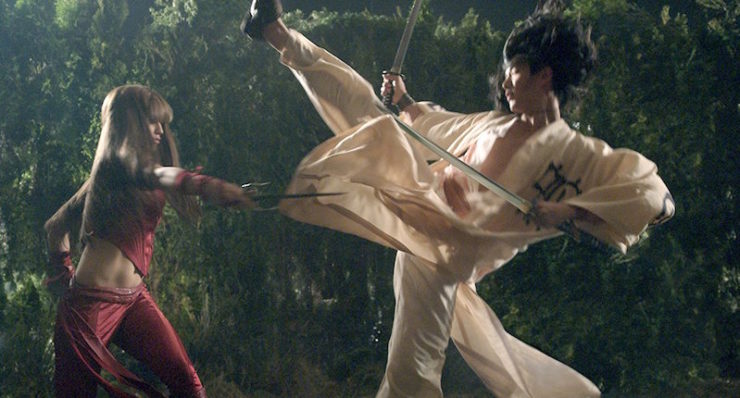
I’m kind of glad that they deleted the scene in which Elektra hallucinates Matt Murdock after being resurrected by Stick from Typhoid’s attack, because it’s a lot easier to take this movie if you disconnect it completely from Daredevil. In all honestly, the connection between the movies is thin at best. In fact, even if you do connect them, it only makes sense if this movie takes place many many many years after Daredevil rather than two. It just doesn’t track that Elektra was able to be resurrected by Stick, go through training with him long enough for her to be declared too angry to continue, get kicked out, and then work as an assassin long enough to gain the reputation that DeMarco waxes rhapsodic about in the opening. For that matter, she doesn’t seem to be affected overmuch by her father’s death—even though that was the source of her righteous anger in Daredevil—nor is the fact that he was a gangster ever discussed.
What’s funny is that, while Daredevil focused on the Kingpin/Bullseye dynamic that was the focus of one of Frank Miller’s first storylines as writer of the monthly comic, Elektra focuses entirely on the Hand, the mystical ninjas that we saw a ton of throughout his run after that. Kirigi, Stone, Stick, and the Hand are all based on characters from that era, while Typhoid is another DD comics villain imported to the Hand for the purposes of the movie.
Not that it stays that close—only Stick is recognizable from the comics (down to the pool hustling, which was how the character was introduced in the comics). The others are either on the other side of the fight (Stone, Stick’s right hand in the comics, and the one who actually resurrected Elektra), unrecognizable (Kirigi, who was a legendary, immortal, silent assassin for the Hand), or made significantly less interesting (Typhoid, a grand, complex creation by Ann Nocenti and John Romita Jr. during their run on the book, who is reduced to a second-rate thug in this movie).
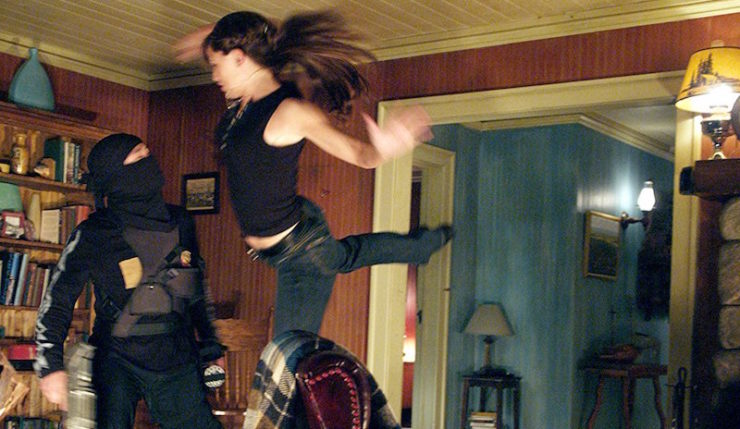
On its own as a movie about a woman stuck in the fight between good and evil, the movie is—okay? I guess? Jennifer Garner has Elektra’s physicality down, and her banter with Kirsten Prout’s Abby is one of the movie’s saving graces, but, just as in Daredevil, she doesn’t have quite the gravitas to pull the character’s tortured elements off.
The rest of the movie is a waste of some fine acting talent. Jason Isaacs deserves way better than to sit in a chair and deliver exposition until he’s stabbed to death, and Cary-Hiroyuki Tagawa similarly deserves way better than to sit at the end of a long table and look authoritative. Goran Visnjic has absolutely no chemistry with either Prout or Garner, which makes him a pretty face in search of someone to play off of and failing (Visnjic is a fine actor, truly, but he just falls flat against both his leading women). Terence Stamp is adequate as Stick, though it’s hard not to compare him to Scott Glenn, who was simply letter-perfect in the role in Marvel’s Daredevil and Marvel’s The Defenders on Netflix. Colin Cunningham and Will Yun Lee do the best they can with the material, and Cunningham (probably best known as Major Davis on Stargate and John Pope on Falling Skies, though my favorite role of his is as the corrupt Detective Curtis on DaVinci’s Inquest) in particular is charming, but the roles are spectacularly clichéd. And Prout is very much like Garner, very good physically—she achieved her black belt in Taekwando the same year this movie was made and she did her own fight scenes—but lacking the ability to convey her character’s depth and tragedy.
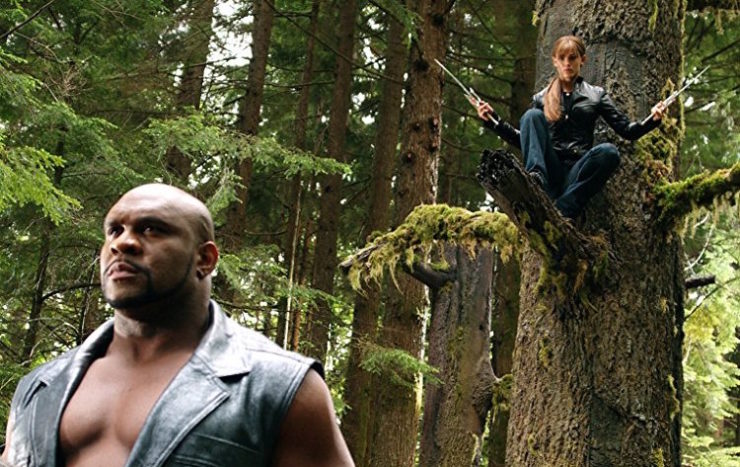
The biggest problem with this movie, though, is that there’s no real engagement with Elektra as a person. Her having died and been resurrected isn’t actually dealt with in any meaningful fashion, beyond explaining how she’s starring in a movie after her character was killed in another movie. Kimagure adepts’ ability to predict the future and resurrect the dead strikes me as something that should be of much greater moment, but these rather major abilities are used solely to facilitate plot mechanics and negate consequences.
There’s also nothing to really indicate what makes Stick’s people (they’re called the Chaste in the comics) particularly good or the Hand particularly evil. Sure, the Hand kills people, but so does Elektra, and Stick even hires her to kill someone. (And what if he was wrong about her and she shot the Millers without a second thought, which was perfectly possible?) There’s no real interaction with the outside world, no indication of what, precisely, is good or evil about either. All the stakes are self-directed and insular.
The movie ultimately is inconsequential and pointless, with none of the pathos of the source material. Visually, it’s adequate, but while Rob Bowman is a great television director, his film work seems unnecessarily small. An Elektra movie should at least have spiffy martial arts action, but even the fight scenes are just kind of blah. Nothing actively bad, but nothing particularly striking, either.
Over the next two weeks, we’ll take a look at the two movies that adapted Mike Mignola’s Hellboy for the big screen.
Keith R.A. DeCandido‘s latest Conan Doyle pastiche story featuring Shirley Holmes & Jack Watson in modern New York City is available in the just-released anthology Baker Street Irregulars: The Game is Afoot from Diversion Books.










